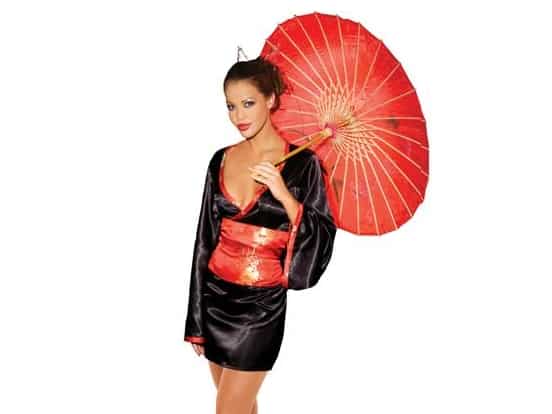
 The list of banned costumes includes geishas and blackface and also forbids Caitlyn Jenner costumes and Bill Cosby and Robin Williams costumes that make fun of rape or suicide.[/caption]
The list of banned costumes includes geishas and blackface and also forbids Caitlyn Jenner costumes and Bill Cosby and Robin Williams costumes that make fun of rape or suicide.[/caption]
The Brock University Students’ Union (BUSU) has put out a warning to students thinking of dressing up for Halloween this year: watch what you wear to the party.
The announcement says because the BUSU is committed to delivering events that honour the diversity of its student membership, certain costumes will not be tolerated at the local campus watering hole, Isaac’s Bar and Grill.
“It’s a matter of paying respect to the stories and experiences of marginalized groups who are depicted in these costumes,” says the BUSU, whose website provides examples of costumes students are prohibited from wearing.
The list includes costumes involving Indigenous head-dresses, burqas, turbans, Day of the Dead make-up, Bindis, Geisha costumes and blackface and also forbids Caitlyn Jenner costumes and Bill Cosby and Robin Williams costumes that make fun of rape or suicide. For students wishing to become more informed about said cultural groups, the BUSU has gamely posted links to Wikipedia entries on a few of them, along with an algorithm for mistake-free Halloween dressing up.
And in a very Canadian move, the students’ union states that those who are denied entry to the bar because of an offensive costume choice “will not lose their place in line” but will rather be asked to change or remove the offending item(s) whereupon they can once again join the party. “BUSU stands in solidarity by prioritizing that cultures are not costumes,” reads the announcement.
Trotting out dress codes is nothing new on university campuses, but this one feels especially remarkable, if not because of its deliciously Big Brother-ish delivery (it’s called the Halloween Costume Vetting Protocol, for reals), then for its ultimately misguided optimism in being able to fully and clearly spell out what counts as an offensive Halloween costume.
Critics are likely to jump in by saying, here is another instance of growing political correctness and over-sensitivity on college and university campuses. All this emphasis on safe spaces and trigger warnings has “scrubbed campuses clean of words, ideas and subjects that might cause discomfort or give offence,” in the words of Atlantic contributors Greg Lukianoff and Jonathan Haidt.
Possibly, and as Lukianoff and Haidt point out, the attempt to shield students from any emotionally disturbing phenomena -words, images, debates in class- is a symptom of our times, where growing epidemics of mental illness are washing over campuses and administrators have responded by trying their best to keep campus life from further upsetting our seemingly fragile student body. The problem, according to Lukianoff and Haidt, is that psychologists have known for some time that more coddling and shielding does not help the person with anxiety to become healthier. In fact, teaching them to “face their fears” and realize that they have the power to live through discomforting experiences and perhaps come out the other side more resilient and stronger.
Students, too, should be taught that they can be exposed to ideas and images they might personally find offensive while not become emotionally incapacitated as a result. How about Brock’s student union and its Halloween message? Does this help or hinder students from becoming fully-fledged, autonomous and resilient adults?
It’s complicated. Times have changed. Appropriating symbols from other cultures, especially those from minority and/or subordinated cultures, has now been rightly recognized pretty much society-wide as not a good thing. Take, for instance, the swell of discussion over the use by the city of Cleveland’s baseball team (along with other sports organizations) of Indigenous motifs.
Thus, bringing up the issue on university campuses of cultural appropriation is important since it creates an educational moment concerning past and present struggles of marginalized groups, the complicity of dominant cultures in this marginalization and the meaning and weight behind cultural signs and symbols.
The problem, however, comes when anyone attempts to label exactly which instances, costumes, etc., should be declared culturally offensive. This is not only an impossibility, any attempts to do so will be met, often rightfully, with a certain amount of derision, as no algorithm is going to weed out every offensive costume.
Rules and institutionalization of moral codes are always going to be tricky business. Should student unions and universities stay out of the muddle? No, it’s their job to at least try to show to students the importance of being culturally sensitive, even if their attempts to do so sometimes come off a little ham-fisted.
Comment
Leave a Reply
You must be logged in to post a comment.



 Share
Share Tweet
Tweet Share
Share




Censorship starts early
Ugh.
I go to Brock, and I love how they respect our cultures enough to do this. If people don’t like it, they can go to a different club; Trust me we have lots of them. It’s not censorship, it’s recognizing that everyone has a right to feel comfortable, while having a good time. Our university focuses on promoting diversity, and respecting it. Wearing blackface is not respectful and neither are the other costumes listed.
Brock is just trying to cover it’s own behind after messing up with the bobsled costume, the issue was not the costume (although I completely agree it was inappropriate) the problem was BUSU named it the BEST costume. Nobody should be dressing up as an Indian, or A Geisha. but when you deny someone entry dressed in a Pirates of the Caribbean costume? If Johnny Depp didn’t receive any scrutiny from his dreadlocks in the movie I do not see how Brock can justify this themselves. Honestly I am appalled to be a Brock grad right now, they are punishing students instead of just owning up to their own mistakes (but what else is new from this school).